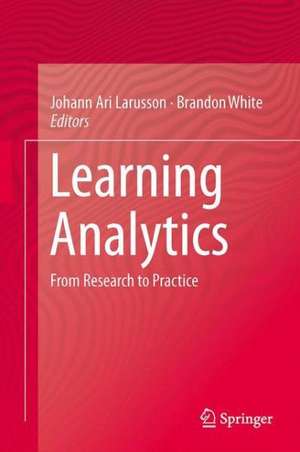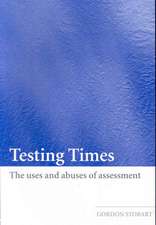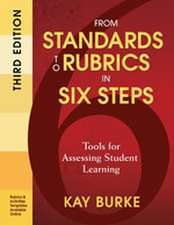Learning Analytics: From Research to Practice
Editat de Johann Ari Larusson, Brandon Whiteen Limba Engleză Hardback – 6 iul 2014
Learning Analytics: From Research to Practice updates this emerging field with the latest in theories, findings, strategies, and tools from across education and technological disciplines. Guiding readers through preparation, design, and examples of implementation, this pioneering reference clarifies LA methods as not mere data collection but sophisticated, systems-based analysis with practical applicability inside the classroom and in the larger world.
Case studies illustrate applications of LA throughoutacademic settings (e.g., intervention, advisement, technology design), and their resulting impact on pedagogy and learning. The goal is to bring greater efficiency and deeper engagement to individual students, learning communities, and educators, as chapters show diverse uses of learning analytics to:
- Enhance student and faculty performance.
- Improve student understanding of course material.
- Assess and attend to the needs of struggling learners.
- Improve accuracy in grading.
- Allow instructors to assess and develop their own strengths.
- Encourage more efficient use of resources at the institutional level.
| Toate formatele și edițiile | Preț | Express |
|---|---|---|
| Paperback (1) | 940.39 lei 6-8 săpt. | |
| Springer – 23 aug 2016 | 940.39 lei 6-8 săpt. | |
| Hardback (1) | 940.85 lei 6-8 săpt. | |
| Springer – 6 iul 2014 | 940.85 lei 6-8 săpt. |
Preț: 940.85 lei
Preț vechi: 1147.38 lei
-18% Nou
Puncte Express: 1411
Preț estimativ în valută:
180.09€ • 195.68$ • 151.37£
180.09€ • 195.68$ • 151.37£
Carte tipărită la comandă
Livrare economică 21 aprilie-05 mai
Preluare comenzi: 021 569.72.76
Specificații
ISBN-13: 9781461433040
ISBN-10: 1461433045
Pagini: 208
Ilustrații: XII, 195 p. 28 illus.
Dimensiuni: 155 x 235 x 20 mm
Greutate: 0.47 kg
Ediția:2014
Editura: Springer
Colecția Springer
Locul publicării:New York, NY, United States
ISBN-10: 1461433045
Pagini: 208
Ilustrații: XII, 195 p. 28 illus.
Dimensiuni: 155 x 235 x 20 mm
Greutate: 0.47 kg
Ediția:2014
Editura: Springer
Colecția Springer
Locul publicării:New York, NY, United States
Public țintă
ResearchCuprins
Introduction.- Designing Learning Analytics Experiences.- Harnessing the Currents of the Digital Ocean.- Educational Data Mining and Learning Analytics.- Analytics through an Institutional Lens: Definition, Theory, Design and Impact.- A Learning Management System-Based Early Warning System for Academic Advising in Undergraduate Engineering.- The Data-Assisted Approach to Building Intelligent Technology Enhanced Learning Environments.- Identifying Points for Pedagogical Intervention Based on Student Writing: Two Case Studies for the "Point of Originality."
Recenzii
“This book is an edited volume concerning the current emerging topics of learning analytics (LA). … The book attempts to provide the first comprehensible reference book for LA by showcasing results, strategies, guidelines, methods, models and tools. … Larusson and White have produced an accessible and interesting introduction to LA, aimed at students, educators, researchers and educational stakeholders.” (Cristóbal Romero and Sebastián Ventura, Technology, Knowledge and Learning, Vol. 20, 2015)
“The book presents a range of excellent topics that are all interlinked with learning analytics. Each paper has a unique perspective on the topic and provides suitable examples and case studies. I would highly recommend this book to educational professionals seeking an informed view on learning analytics.” (S. M. Godwin, Computing Reviews, November, 2014)
“The book presents a range of excellent topics that are all interlinked with learning analytics. Each paper has a unique perspective on the topic and provides suitable examples and case studies. I would highly recommend this book to educational professionals seeking an informed view on learning analytics.” (S. M. Godwin, Computing Reviews, November, 2014)
Notă biografică
Johann Ari Larusson is a Senior Research Scientist in the Center for Digital Data, Analytics and Adaptive Learning at Pearson. He first joined Pearson as a Senior Recommendation Engineer where he led research and development of recommendation engine technologies and adaptivity and analytics for the Alleyoop product. His research and applied work are primarily in the fields of educational technology, learning analytics, computer-mediated collaborative learning (CSCL) and software engineering. Prior to Pearson, he held various R&D positions in the technology industry, academia and banking. Even prior to educational technology, his work centered around transmission, manipulation and analysis of large volumes of (unstructured) data. Johann has authored and co-authored several peer-reviewed and award-winning publications, was a founding member and chair of the First North East Regional Learning Analytics Symposium, and has served as a reviewer for a number of journals and conferences. He holds a Ph.D. in Computer Science from Brandeis University.
Brandon White is a doctoral candidate in English at the University of California, Berkeley, where his theoretical interests in pedagogical history intersect with inquiries in applied educational technology. His work and research in learning analytics primarily concerns language recasting as deployed in student writing, and as taken up by educational theory, linguistics, and psychology. He is particularly invested in developing methods for identifying, isolating, and weighing markers for students’ success based on their written content. Before coming to Berkeley, he was a Teaching and Learning Fellow at Brandeis University, where he also earned his Master’s degree in Cultural Production, and continued to work as a consultant in educational technology for Research and Instruction Services. He is the author of a number of peer-reviewed publications and has served on several advisory committees for teaching and learning in higher education.
Brandon White is a doctoral candidate in English at the University of California, Berkeley, where his theoretical interests in pedagogical history intersect with inquiries in applied educational technology. His work and research in learning analytics primarily concerns language recasting as deployed in student writing, and as taken up by educational theory, linguistics, and psychology. He is particularly invested in developing methods for identifying, isolating, and weighing markers for students’ success based on their written content. Before coming to Berkeley, he was a Teaching and Learning Fellow at Brandeis University, where he also earned his Master’s degree in Cultural Production, and continued to work as a consultant in educational technology for Research and Instruction Services. He is the author of a number of peer-reviewed publications and has served on several advisory committees for teaching and learning in higher education.
Textul de pe ultima copertă
In education today, technology alone doesn't always lead to immediate success for students or institutions. In order to gauge the efficacy of educational technology, we need ways to measure the efficacy of educational practices in their own right. Through a better understanding of how learning takes place, we may work toward establishing best practices for students, educators, and institutions. These goals can be accomplished with learning analytics.
Learning Analytics: From Research to Practice updates this emerging field with the latest in theories, findings, strategies, and tools from across education and technological disciplines. Guiding readers through preparation, design, and examples of implementation, this pioneering reference clarifies LA methods as not mere data collection but sophisticated, systems-based analysis with practical applicability inside the classroom and in the larger world.
Case studies illustrate applications of LA throughout academic settings (e.g., intervention, advisement, technology design), and their resulting impact on pedagogy and learning. The goal is to bring greater efficiency and deeper engagement to individual students, learning communities, and educators, as chapters show diverse uses of learning analytics to:
Learning Analytics: From Research to Practice updates this emerging field with the latest in theories, findings, strategies, and tools from across education and technological disciplines. Guiding readers through preparation, design, and examples of implementation, this pioneering reference clarifies LA methods as not mere data collection but sophisticated, systems-based analysis with practical applicability inside the classroom and in the larger world.
Case studies illustrate applications of LA throughout academic settings (e.g., intervention, advisement, technology design), and their resulting impact on pedagogy and learning. The goal is to bring greater efficiency and deeper engagement to individual students, learning communities, and educators, as chapters show diverse uses of learning analytics to:
- Enhance student and faculty performance.
- Improve student understanding of course material.
- Assess and attend to the needs of struggling learners.
- Improve accuracy in grading.
- Allow instructors to assess and develop their own strengths.
- Encourage more efficient use of resources at the institutional level.
Caracteristici
Consolidates current Learning Analytics research into one volume Includes numerous examples of Learning Analytics implementations Provides strategies for integrating Learning Analytics at the classroom, departmental, and institutional level








